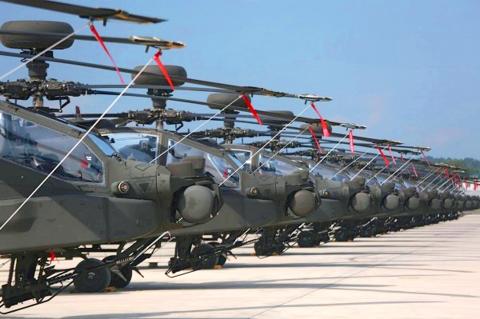The nation’s second squadron of Apache attack helicopters is likely to enter service later this year after the first squadron was commissioned last year by the Army Aviation and Special Forces Command, an army officer said yesterday.
After undergoing rigorous testing, the second Apache combat team is expected to be commissioned in the middle of this year, said the officer, who spoke on condition of anonymity.
The launch of the first squadron has shown that the Apache helicopters are combat-ready, while the formation of the additional squadron means it has full combat and defense capabilities, he said.

Photo: Courtesy of the Military News Agency
The command’s 601st Brigade has been training personnel and upgrading its equipment since 2013, the command said, adding that after more than two years of training, one of the two Apache squadrons was commissioned in June last year and has since then contributed greatly to improving the army’s combat capability.
Taiwan in 2008 ordered 30 Boeing AH-64E Apache helicopters from the US for about NT$59.3 billion (US$2.01 billion at the current exchange rate), including personnel training and logistics, and took delivery of the aircraft from November 2013 to October 2014.
One of the helicopters was destroyed in April 2014 after it crashed during a training flight in Taoyuan.
The AH-64E is also known as a “tankbuster.” It is equipped with powerful target acquisition radar that is capable of 360-degree operation for up to 8km, and can simultaneously track up to 128 targets and engage the 16 most dangerous, the command said, adding that it carries 16 Hellfire missiles and can deploy them in less than 30 seconds.
In related news, the army has decided to start phasing out its Bell UH-1H helicopters by the end of this year, even though there are not enough Sikorsky UH-60M Black Hawk helicopters to replace them, an anonymous defense official said yesterday.
Although the military originally intended to replace the army’s aging UH-1H fleet with the 60 UH-60Ms it bought from the US, half of the Black Hawks were later allotted to other aviation services, the official said.
President Tsai Ing-wen (蔡英文) and former president Ma Ying-jeou (馬英九) each ordered the reassignment of 15 aircraft to the Air Rescue Group and the National Airborne Service Corps respectively, leaving only 30 Black Hawks for the army, the official said.
While the army has held off retiring the UH-1Hs, their ready rate and maintenance costs are no longer acceptable, the official said.
The army believes that the government should buy another 32 UH-60M helicopters from the US, if budget allows, the official said.
Taiwan from 1970 to 1976 built 118 UH-1H helicopters under license, meaning that the last batch of airframes are 42 years old, the official said.
The army intends to donate some of the phased-out aircraft to technical training schools, they added.

SECURITY: As China is ‘reshaping’ Hong Kong’s population, Taiwan must raise the eligibility threshold for applications from Hong Kongers, Chiu Chui-cheng said When Hong Kong and Macau citizens apply for residency in Taiwan, it would be under a new category that includes a “national security observation period,” Mainland Affairs Council (MAC) Minister Chiu Chui-cheng (邱垂正) said yesterday. President William Lai (賴清德) on March 13 announced 17 strategies to counter China’s aggression toward Taiwan, including incorporating national security considerations into the review process for residency applications from Hong Kong and Macau citizens. The situation in Hong Kong is constantly changing, Chiu said to media yesterday on the sidelines of the Taipei Technology Run hosted by the Taipei Neihu Technology Park Development Association. With

CARROT AND STICK: While unrelenting in its military threats, China attracted nearly 40,000 Taiwanese to over 400 business events last year Nearly 40,000 Taiwanese last year joined industry events in China, such as conferences and trade fairs, supported by the Chinese government, a study showed yesterday, as Beijing ramps up a charm offensive toward Taipei alongside military pressure. China has long taken a carrot-and-stick approach to Taiwan, threatening it with the prospect of military action while reaching out to those it believes are amenable to Beijing’s point of view. Taiwanese security officials are wary of what they see as Beijing’s influence campaigns to sway public opinion after Taipei and Beijing gradually resumed travel links halted by the COVID-19 pandemic, but the scale of

A US Marine Corps regiment equipped with Naval Strike Missiles (NSM) is set to participate in the upcoming Balikatan 25 exercise in the Luzon Strait, marking the system’s first-ever deployment in the Philippines. US and Philippine officials have separately confirmed that the Navy Marine Expeditionary Ship Interdiction System (NMESIS) — the mobile launch platform for the Naval Strike Missile — would take part in the joint exercise. The missiles are being deployed to “a strategic first island chain chokepoint” in the waters between Taiwan proper and the Philippines, US-based Naval News reported. “The Luzon Strait and Bashi Channel represent a critical access

Pope Francis is be laid to rest on Saturday after lying in state for three days in St Peter’s Basilica, where the faithful are expected to flock to pay their respects to history’s first Latin American pontiff. The cardinals met yesterday in the Vatican’s synod hall to chart the next steps before a conclave begins to choose Francis’ successor, as condolences poured in from around the world. According to current norms, the conclave must begin between May 5 and 10. The cardinals set the funeral for Saturday at 10am in St Peter’s Square, to be celebrated by the dean of the College